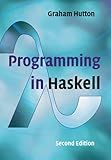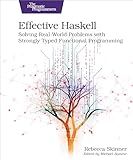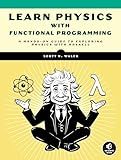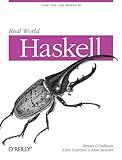Best Haskell Programming Guides to Buy in January 2026

Programming in Haskell



Effective Haskell: Solving Real-World Problems with Strongly Typed Functional Programming



Learn Physics with Functional Programming: A Hands-on Guide to Exploring Physics with Haskell



Real World Haskell
- AFFORDABLE CHOICE: SAVE MONEY WITH QUALITY USED BOOKS.
- ECO-FRIENDLY OPTION: PROMOTE SUSTAINABILITY BY BUYING USED.
- UNIQUE FINDS: DISCOVER RARE TITLES NOT AVAILABLE IN STORES.



Learn You a Haskell for Great Good!: A Beginner's Guide
- HIGH-QUALITY USED BOOKS AT A FRACTION OF RETAIL PRICES.
- ECO-FRIENDLY CHOICE: REDUCE WASTE WITH PRE-LOVED BOOKS.
- FAST SHIPPING ENSURES QUICK DELIVERY FOR EAGER READERS.



Get Programming with Haskell


To convert a Char to an Int in Haskell, you can use the ord function from the Data.Char module. ord takes a Char as input and returns its corresponding Unicode character code as an Int.
Here's an example usage:
import Data.Char (ord)
charToInt :: Char -> Int charToInt c = ord c
main :: IO () main = do let ch = 'A' let result = charToInt ch putStrLn $ "Character '" ++ [ch] ++ "' as Int: " ++ show result
In the example above, we import the ord function from the Data.Char module. The charToInt function takes a Char c as input and returns its integer representation using ord c. Then, in the main function, we demonstrate the usage by converting the character 'A' to an Int and displaying the result using putStrLn.
Note that since Haskell is a strongly typed language, the types of Char and Int are distinct and cannot be directly converted without a function like ord.
How would you convert a char to its corresponding ASCII character and handle non-numeric chars in Haskell?
In Haskell, you can convert a Char to its corresponding ASCII character by using the ord function from the Data.Char module.
To handle non-numeric characters, you can check if a character is a digit using the isDigit function from the same module. Here's an example:
import Data.Char
charToAscii :: Char -> Maybe Int charToAscii c | isDigit c = Just (ord c) | otherwise = Nothing
The charToAscii function takes a Char as input and returns a Maybe Int. If the character is a digit, it converts it to its ASCII value using ord and wraps it in a Just constructor. If the character is not a digit, it returns Nothing.
You can use this function as follows:
main :: IO () main = do putStrLn "Enter a character:" char <- getChar case charToAscii char of Just ascii -> putStrLn $ "ASCII value: " ++ show ascii Nothing -> putStrLn "Not a digit."
In this example, main prompts the user to enter a character, reads it from the console using getChar, and then calls charToAscii to get the corresponding ASCII value. If it's a digit, it prints the ASCII value; otherwise, it prints "Not a digit."
Can you convert a string of chars to a list of ints in Haskell?
Yes, you can convert a string of characters to a list of integers in Haskell using the ord function from the Data.Char module. The ord function returns the Unicode value of the character. Here's an example:
import Data.Char (ord)
stringToIntList :: String -> [Int] stringToIntList = map ord
In the stringToIntList function, we use the map function to apply the ord function to each character of the string, which converts it to its corresponding Unicode value. The result is a list of integers.
Here's an example usage:
main :: IO () main = do let str = "Hello, World!" intList = stringToIntList str putStrLn $ show intList
Output:
[72,101,108,108,111,44,32,87,111,114,108,100,33]
In this example, the string "Hello, World!" is converted to a list of integers.
Is there a way to convert a char to its corresponding ASCII character using guards in Haskell?
Yes, you can use guards in Haskell to convert a Char to its corresponding ASCII character. The ASCII value of a Char can be obtained by using the ord function from the Data.Char module.
Here's an example of using guards to convert a Char to its ASCII value:
import Data.Char (ord)
charToAscii :: Char -> Int charToAscii c | isAscii c = ord c | otherwise = error "Invalid input: not an ASCII character"
In the above example, isAscii is a function from the Data.Char module that checks if a Char is an ASCII character. If the input Char is an ASCII character, the ord function is used to convert it to its corresponding ASCII value. Otherwise, an error is thrown indicating that the input is not an ASCII character.
You can call the charToAscii function with a Char and get its ASCII value:
main :: IO () main = do let c = 'A' -- Character to convert asciiValue = charToAscii c putStrLn $ "ASCII value of " ++ show c ++ " is " ++ show asciiValue
Output:
ASCII value of 'A' is 65
How would you convert a char to an int using pattern matching in Haskell?
To convert a Char to an Int using pattern matching in Haskell, you can define a function that matches specific characters and assigns corresponding values. Here's an example implementation:
charToInt :: Char -> Int charToInt '0' = 0 charToInt '1' = 1 charToInt '2' = 2 charToInt '3' = 3 charToInt '4' = 4 charToInt '5' = 5 charToInt '6' = 6 charToInt '7' = 7 charToInt '8' = 8 charToInt '9' = 9 charToInt _ = -1 -- Handle any other character, returning -1 as a default/error value
In this implementation, each character '0' to '9' is matched in separate patterns and assigned the corresponding integer value. The underscore _ is used as a catch-all pattern to handle any other character by returning -1, indicating an error or an invalid input.
You can use this function as follows:
main :: IO () main = do let c = '5' let i = charToInt c putStrLn $ "Character: " ++ [c] ++ ", Integer: " ++ show i
Here, the character '5' is converted to an integer using the charToInt function, and the result is printed as part of a string. Running main would output:
Character: 5, Integer: 5
